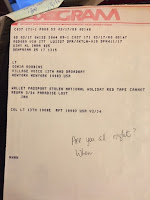I worked
for an assistant minister—I think it was Arthur Caliandro, who followed Peale
as minister, but can’t be sure—who liked to have long conversations with me
after I made it clear that I was an atheist. I think ihe was first interested
in my being Jewish, wondered whether that would be a problem for me working at
the church, and when I said no, I wasn’t religious in any way, he was even more
intrigued. I think he wanted to persuade me to become religious, and I didn’t
mind these conversations because it was more interesting than the secretarial
work I was being paid for.
There was
no smoking in the office, so if I wanted a cigarette, I had to go to the
ladies’ room and smoke in a stall. Perhaps I wasn’t supposed to do that either,
but I don’t remember being chided for it. I worked there for several months,
but by the following spring, I was temping elsewhere.
You may
remember during last year’s campaign mention of Trump’s attendence at Marble
Collegiate Church. The current minister says he was never an active member, but
he did marry his first two wives there. Here’s a Washington Post article from
almost two years ago about Trump and Peale.
Side
note on Norman Vincent Peale: My senior year in high school, I took a class
called Social Problems. The teacher, Mr. Wilcox, was primarily the football
coach. One of our assignments was to read Peale’s column in the Sunday
Philadelphia Inquirer every week and discuss it in class. He was also against
alcohol and maintained that when the Bible referred to “wine,” it really meant
“grape juice.” (My yearbook tells me that he graduated from Swarthmore College,
which surprises me, and the Internet informs me that he was president of his
freshman class in 1923-1924.) #52essays2017



